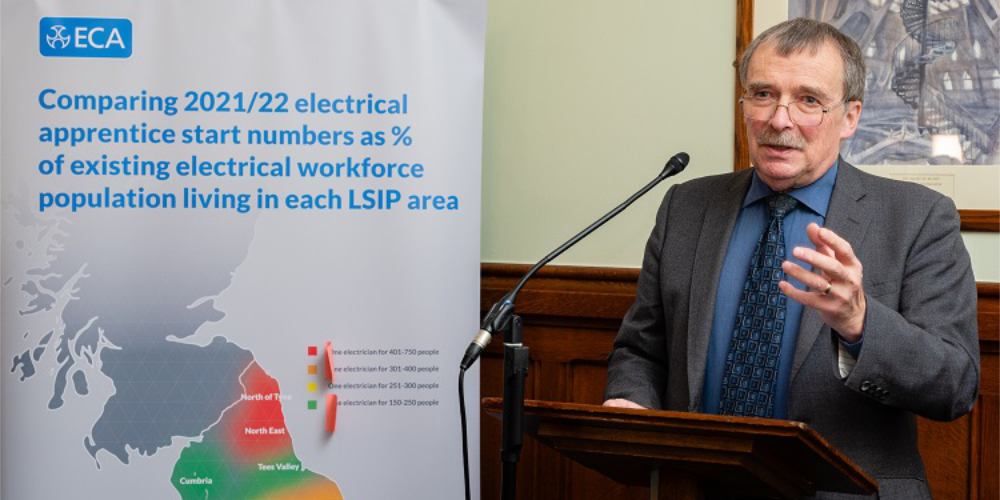Electrical sector skills recharge at the House of Commons, as skills shortage bites
Contents |
[edit] ECA recharges electrical skills at the House of Commons long-awaited Parliamentary event
Held in the House of Commons in Westminster, Recharging Electrical Skills was a landmark meeting with Members, skills providers and MPs, aimed at increasing awareness about the significance of the electrical contracting sector and electrical skills in achieving the UK's net zero goals.
Key themes from the event included:
- Placing skilled electricians at the core of net zero.
- The need for more apprentice starts and qualified electricians.
- Improved support for job placements a more robust skills pipeline.
The reception opened with remarks from Alan Whitehead MP, our event sponsor, followed by comments from Andrew Eldred, ECA Director of Workforce and Public Affairs.
Alan Whitehead MP, Shadow Energy Minister, said: “Labour’s mission to make Britain a clean energy superpower will create and sustain good jobs across the country. Electricians will be absolutely crucial for delivering many of the low-carbon technologies that will form the backbone of our future green economy.
"We need to make sure that our skills system is set up to train the electricians of the future and meet the growing needs of households and businesses in the transition to cheaper, cleaner energy.”
As part of the event, we also launched the 'Future Electrical Skills' Framework, setting out the ECA’s recommendations to bridge the electrician skills gap, accelerate the adoption of low carbon technologies, and ensure high-quality and safe installation and integration of electrical systems.
[edit] ECA's Recharging Electrical Skills Charter
ECA Members and other guests had the opportunity to sign ECA's Recharging Electrical Skills Charter, to show their support for these policy positions.
View the full Charter here.
Electrical contracting businesses will play a pivotal role in the transition to a net-zero economy by ensuring the safe, efficient, and sustainable use of electrotechnical systems, including those central to net zero. But workforce capacity and competence must be prioritised if we are to achieve our net-zero goals.
Shortages of qualified electricians and other competent personnel are currently the number one business issue for ECA Members (as revealed each quarter by the ECA/ BESA Building Engineering Business Survey). These shortages do not necessarily result from a lack of people wanting to join the industry, but more so from a broken skills pipeline which currently prevents enough people from progressing to complete their training.
[edit] Electrical sector feels skills shortage bite
The latest quarterly survey of the UK engineering services sector, backed by leading trade bodies ECA, BESA, SELECT and SNIPEF, reveals that electrotechnical businesses are being significantly impacted by skills and labour shortages. Meanwhile, most business owners in the sector continue to grapple with high prices and slow payment times.
Almost a third of respondents (30%) said their business’ turnover had dropped since Q2 – a marked increase since the last survey, covering Q1 and Q2, when just 1 in 5 respondents (19%) said their turnover had fallen since the start of the year. A fifth (21%) expect their turnover to fall again between now and the end of the year.
Nearly 2 in 5 respondents (38%) cited labour shortages as the biggest threat to their business. Other major concerns include delays to projects (20%) and cashflow (17%).
Of the respondents who currently have vacancies in their business, trouble filling those vacancies was blamed on pay expectations being too high (57%), applicants lacking sufficient skills (46%) and an insufficient number of applicants (41%).
When it comes to being paid on time, almost two thirds (57%) of respondents said that commercial clients and main contractors took 31 to 60 days to pay for work. Over 1 in 10 (21%) said they took 61 to 90 days – a drop of 50% since the last survey, indicating some improvement.
Payment times appear to have slowed in the public sector, with more than half (51%) of respondents saying public sector clients took 31 to 60 days to pay for work, and a tenth (9%) saying they took 61 to 90 days.
This article appears on the ECA news and blog site as "ECA Recharges Electrical Skills at the House of Commons" and "Electrical sector feels skills shortage bite" dated November 29, 2023.
--ECA
[edit] Related articles on Designing Buildings
- Apprenticeships levy.
- Cabinet office payment rules within the procurement act welcomed.
- Call for support in green electrical apprentice shortfall.
- Construction Industry Training Board CITB.
- ECA helps Welsh Government consultation on Net Zero Skills..
- ECA Project Net Zero roadshow..
- Electrical skills shortage in Eastern England.
- Engineering services industry grapples with rising demand and skills shortage.
- Impact of labour shortages worsen for engineering services.
- National Infrastructure Plan for Skills.
- Net Zero not possible without right skills..
- Order books fill but skills shortages worry contractors.
- Protection for apprenticeships.
- Put electricians at the heart of the clean energy transition, says ECA.
- Skilled workforce unable to meet net zero ambitions.
- Skills shortage.
- Skills shortage and Brexit.
Featured articles and news
International Electrician Day, 10 June 2025
Celebrating the role of electrical engineers from André-Marie Amperè, today and for the future.
New guide for clients launched at Houses of Parliament
'There has never been a more important time for clients to step up and ...ask the right questions'
The impact of recycled slate tiles
Innovation across the decades.
EPC changes for existing buildings
Changes and their context as the new RdSAP methodology comes into use from 15 June.
Skills England publishes Sector skills needs assessments
Priority areas relating to the built environment highlighted and described in brief.
BSRIA HVAC Market Watch - May 2025 Edition
Heat Pump Market Outlook: Policy, Performance & Refrigerant Trends for 2025–2028.
Committing to EDI in construction with CIOB
Built Environment professional bodies deepen commitment to EDI with two new signatories: CIAT and CICES.
Government Grenfell progress report at a glance
Line by line recomendation overview, with links to more details.
An engaging and lively review of his professional life.
Sustainable heating for listed buildings
A problem that needs to be approached intelligently.
50th Golden anniversary ECA Edmundson apprentice award
Deadline for entries has been extended to Friday 27 June, so don't miss out!
CIAT at the London Festival of Architecture
Designing for Everyone: Breaking Barriers in Inclusive Architecture.
Mixed reactions to apprenticeship and skills reform 2025
A 'welcome shift' for some and a 'backwards step' for others.
Licensing construction in the UK
As the latest report and proposal to licence builders reaches Parliament.
Building Safety Alliance golden thread guidance
Extensive excel checklist of information with guidance document freely accessible.
Fair Payment Code and other payment initiatives
For fair and late payments, need to work together to add value.
Pre-planning delivery programmes and delay penalties
Proposed for housebuilders in government reform: Speeding Up Build Out.
High street health: converting a building for healthcare uses
The benefits of health centres acting as new anchor sites in the high street.



























